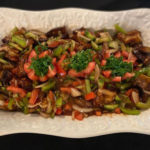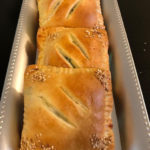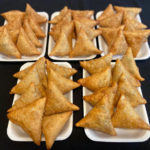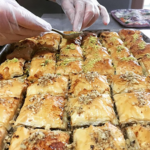Maha Hassen:
From shy apprentice to confident, enterprising cook
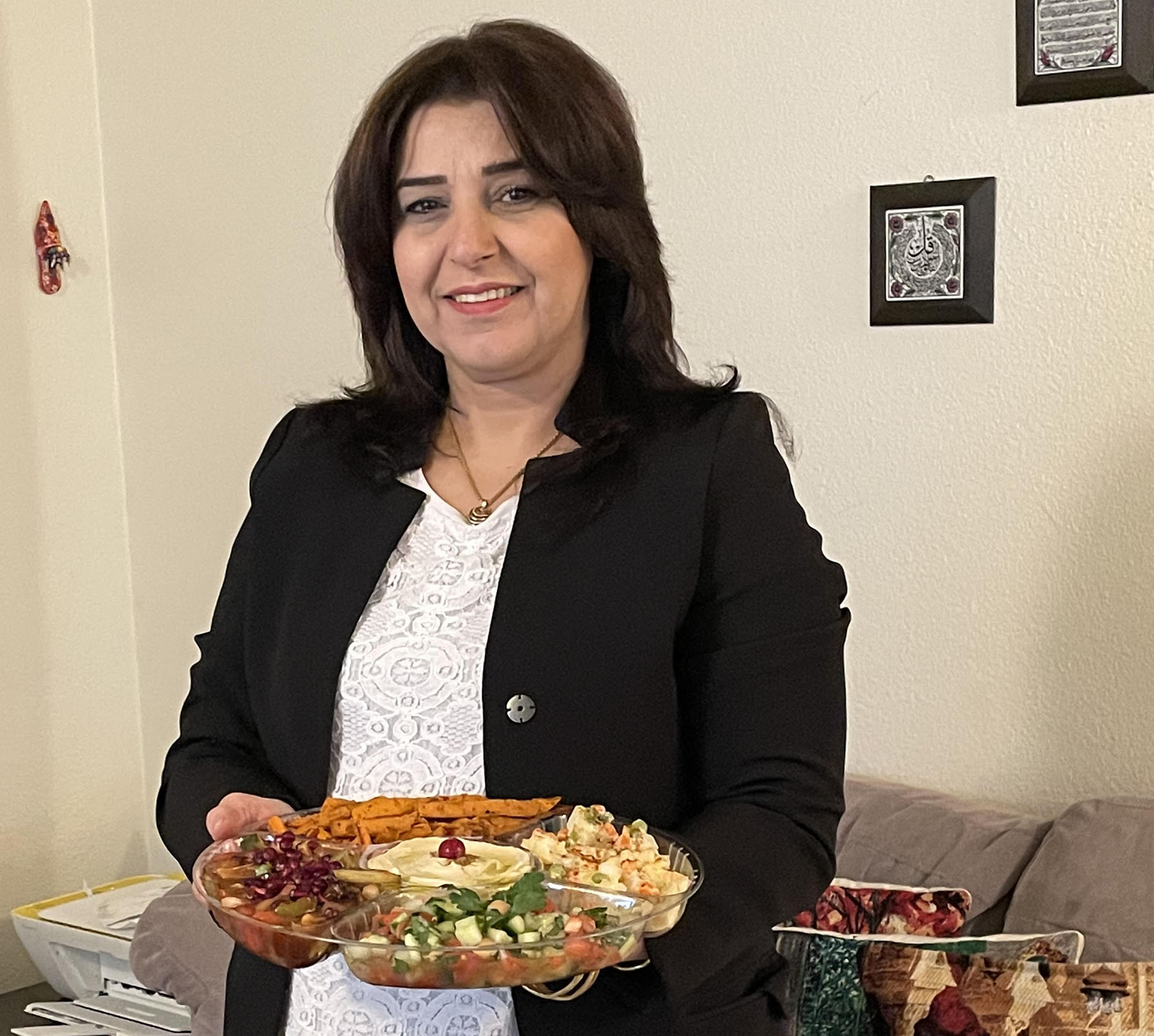
“All the students here are family.”
Maha Hassen’s years working with Project Feast – and her love for sharing her traditional Iraqi dishes – gave her the confidence to inspire and teach other immigrant cooks.
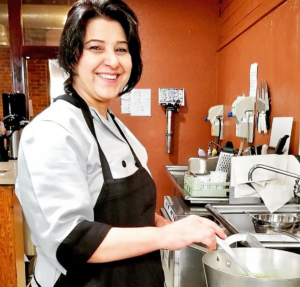 Maha Hassen moved smoothly through her morning prep in the Ubuntu Street Cafe kitchen, dicing potatoes and beets into neat cubes for a salad dressed in yogurt and garnished with mint. She chopped lettuce and herbs for another salad – this one a Turkish bulgur recipe bright with lemon, one of her favorite flavors – and nestled scoops into lettuce cups. With an hour until the cafe opened, Maha worked through tasks for the next day as well as the morning mise en place. And always a generous host, she took an extra moment to spoon pomegranate molasses over a plate of baba ganoush, topping it with tomatoes and cucumbers, for an early visitor to the kitchen.
Maha Hassen moved smoothly through her morning prep in the Ubuntu Street Cafe kitchen, dicing potatoes and beets into neat cubes for a salad dressed in yogurt and garnished with mint. She chopped lettuce and herbs for another salad – this one a Turkish bulgur recipe bright with lemon, one of her favorite flavors – and nestled scoops into lettuce cups. With an hour until the cafe opened, Maha worked through tasks for the next day as well as the morning mise en place. And always a generous host, she took an extra moment to spoon pomegranate molasses over a plate of baba ganoush, topping it with tomatoes and cucumbers, for an early visitor to the kitchen.
All around the kitchen, Maha radiated confidence – a legacy of her years working with Project Feast, first as a student and then as a core member of the kitchen team. “When I came, I was very shy and scared of everything,” said Maha, who arrived in Seattle in 2015 with her husband and then-teenaged daughters. The family had endured years of hardship in Iraq, where Maha’s husband was kidnapped and tortured, and explosions destroyed part of their home. Leaving their homeland launched the family on an arduous, expensive 10-year journey that wound through Egypt, Syria and Jordan. Along the way, despite the dangers at home, sometimes her family had to return to Iraq. “When the money is done, I would come again to my country,” Maha said. The family would save up until they could move again.
“Life is very hard when you move to another country,” Maha said. “My daughters don’t have any memory for my country. They don’t have friends or family. They had different schools all the time.”
In 2015, the International Refugee Committee helped the family get settled in the Seattle area, but life in the Pacific Northwest brought new challenges. “It was different everything – weather, culture, people,” Maha said. Soon after she arrived, she found work in a restaurant at Seattle-Tacoma International Airport. “It was a hard time for me because I didn’t speak English – just ‘yes’ and ‘no,’” she said. “I didn’t have any experience and I hadn’t worked before. It was very hard for me and all the time, I would cry.”
Maha took English classes at Highline College, and there she saw an advertisement for the Project Feast apprenticeship. She had loved to cook since she was a child learning to make Iraqi tea cake and other favorite dishes from her mother. In Project Feast, she saw the opportunity to learn skills in food-handling, menu-planning and customer service that would translate in American commercial kitchens.
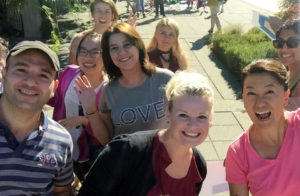
Maha (in the “Love” t-shirt) with apprentices.
“Project Feast accepts me and this is good for me,” she said. “I see other people from different countries, speaking different languages. They give me power and courage.” Students in her class had come to Seattle from Pakistan, Syria, Iraq and Vietnam. Maha enjoyed learning how Pakistani biryani was different from the Iraqi biryani she knew – and how to make Vietnamese food. “That was very new,” she said. “I didn’t know how to make noodles.”
“The mix of different languages, different cultures, different food – It’s amazing,” she said. “All the students here are family. It’s very good.”
After her apprenticeship, Project Feast helped Maha find a job at Airways Brewing, The Bistro & Beer Garden, where she had the opportunity to feature her own recipes. “I understand what I’m doing and have more experience because of the experience at Project Feast,” she said. “One day of the week I could make Iraqi food. It became more personal for me.”
In 2018, Maha came back to Project Feast, on staff. She loved contributing to the cafe and catering menus, which often featured dishes like her kabbsi chicken and tepsi bathenjen, a roasted eggplant dish that became a staff favorite. “I have more ideas,” she said. “Iraqis like to eat.”
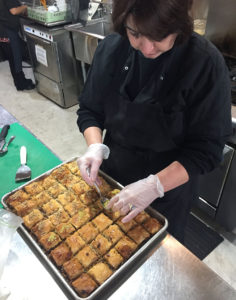 One morning on a day off from Project Feast, Maha and her daughter Raghdah shared Turkish coffee in tiny silver-filigreed cups alongside homemade Iraqi tea cake. Maha reflected on how she hoped to pass along her confidence – as well as her passion for Iraqi food – to new Project Feast students.
One morning on a day off from Project Feast, Maha and her daughter Raghdah shared Turkish coffee in tiny silver-filigreed cups alongside homemade Iraqi tea cake. Maha reflected on how she hoped to pass along her confidence – as well as her passion for Iraqi food – to new Project Feast students.
“For refugees and immigrants, you need the support around to change your life, to learn more things, to be strong, to believe in yourself,” Maha said. She would tell new apprentices: “Study. Ask. Don’t be shy.”
“Project Feast gives students love, kindness, caring, support,” she said. “They support me all the time and push me to be better and a more experienced cook. I don’t find this any place else like Project Feast. You feel you have some power around you.”
In February 2020, Maha felt ready to focus on opening her own catering company or takeout restaurant in south King County. She left Project Feast and took business classes to prepare – and then the pandemic forced her to put those plans on hold. But she never stopped cooking. She is currently making sambusacs and other favorite Iraqi dishes for the Bar Group restaurant at Seattle-Tacoma International Airport. “When everything opens up again, I want to start my business,” she said. “Maybe in the summer.”
– Interview and writing by Denise Clifton, Tandemvines Media
Eggplant Salad
Ingredients
For the dressing:
- 1 cup ketchup
- 1 cup steak sauce
- 1/2 tbsp salt, or to taste
- 1/2 cup lemon juice
For the salad:
- 3 large eggplant, julienned and fried in a little oil until golden
- 2 cups onions, thinly sliced
- 3 cups tomatoes, sliced
- 2 cups green peppers, sliced
- 2 cups cucumber, cut in half lengthwise and sliced into half-moons about 1/4-inch thick
- Seeds of 1 pomegranate
- A small handful of chopped mint leaves, optional
Instructions
- 1. To prepare the dressing, mix the ketchup, steak sauce, lemon juice and salt in a large bowl. Adjust to taste.
- 2. Add the cucumbers, peppers, onions and tomatoes and mix them all together.
- 3. Finally, add the eggplant and pomegranate seeds and mix gently so as not to break up the cooked eggplant.
- 4. Garnish with mint if desired.
Fatayer (Iraqi Pastry with Spinach-Cheese Filling)
Ingredients
Filling ingredients:
- 4 lbs fresh spinach
- 3 to 4 cups grated Mozzarella cheese
- 1 tbsp salt
- 2 tbsp olive oil
- 1 tsp crushed red pepper
Dough ingredients
- 5 cups flour
- 1/2 cup vegetable oil
- 2 cups warm water
- 2 tbsp yeast
- 1 tbsp sugar
- 1 tbsp baking powder
- sesame seeds, for optional garnish
Instructions
Filling instructions:
- 1. Chop the spinach and season it with 1 tbsp salt, and then rub it until the water comes out of it.
- 2. Put the spinach in a strainer and squeeze out as much liquid as you can.
- 3. Place the spinach in a large bowl and add the cheese, olive oil and crushed red pepper. Mix well.
Dough instructions:
- 1. Put 2 cups of flour in a large bowl and mix it with the warm water, yeast and sugar. Leave it to rest for 10 minutes.
- 2. Then add the rest of the flour to the mixture along with the salt, baking powder and vegetable oil and knead the dough for 10 minutes. Cover the bowl, and leave it to rest for 10 minutes.
Assemble the fatayer:
- 1. Roll the dough out until it’s about 1/2-inch thick. Cut it into equal squares, approximately 2 x 2 inches.
- 2. Place about 1 ½ tbsp of filling in the middle of a square. Brush the edges of the square with a little water. Then, take a second square and place it over the first square, pressing on the edges with a fork to seal the squares. You can trim excess dough from the sides if desired.
- 3. For decoration, you can make two cuts on the top with a knife and sprinkle with some sesame seeds.
- 4. Grease a baking tray with oil and place the finished pastries about 1 inch apart. Bake in a 400-degree F oven for 15 to 20 minutes or until the crust is a nice golden brown.
Beef Burke
Ingredients
- 12 fresh tortillas, ready to cook, like Tortilla Land brand
- 2 lbs ground beef
- 1 cup onion, finely chopped
- 1 cup parsley, finely chopped
- 1 tsp black pepper
- 1 tsp salt
- 1 tbsp oil, plus more for deep frying.
Instructions
Prepare the filling:
- 1. Heat 1 tbsp of oil in a large skillet over medium-high heat. Add the beef and cook until the meat is no longer pink and all the liquid is dried up.
- 2. Add the onions to the pan along with the salt and pepper and stir-fry for approximately 10 minutes. Remove from heat and let cook for 10 to 15 minutes.
- 3. Add the parsley and mix well. Taste for seasonings and adjust to taste.
Shaping and filling the tortilla:
- 1. Cut a tortilla into halves as shown in the picture.
- 2. Take one of the halves and fold into thirds to create a triangle: fold one pointed edge towards the center of the rounded side, thus creating a triangle on one side. Then take the other pointed edge and fold it so that the flat edge aligns with the outer edge of the triangle. You should now have one triangle.
- 3. Now, when you open the top, you should have an ice cream cone-shaped pastry. Place about 2 tbs of the prepared beef filling into the cone. Fold the edge in and glue it with some water to make sure the filling won’t spill out of the tortilla when you fry it.
- 4. Finally, deep fry the beef burke until the outside is golden brown.
- Makes 24 pastries. Enjoy them hot!
Baklava
Ingredients
For syrup
- 2 cups sugar
- 1 ¼ cups water
- ⅛ tsp citric acid
For baklava:
- 1 box phyllo dough thawed
- 2 cups butter melted
- ¼ cup oil
- 2 to 3 cups walnuts
- 2 tbsp sugar
Instructions
Make the syrup:
- In a saucepan mix together all the ingredients and boil on medium high heat for 5 minutes. Set aside to cool
Assemble the baklava:
- 1. Preheat the oven to 400 degrees F
- 2. Pulse the walnuts in a food processor
- 3. Grease a baking pan with butter and layer with 6 to 8 phyllo sheets. Brush with butter in between layers.
- 4. Sprinkle with crushed walnuts
- 5. Put another layer of phyllo, layering with butter in between layers.
- 6. Carefully slice the baklava into 1 ½-inch-wide strips lengthwise, then slice diagonally to create diamond-shaped baklava. Or just slice squares if you prefer.
- 7. Bake the baklava for 50 minutes, until golden on the edges and tops
- 8. Let the baklava cool for 5 to 6 hours before serving

